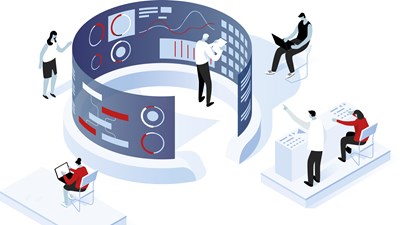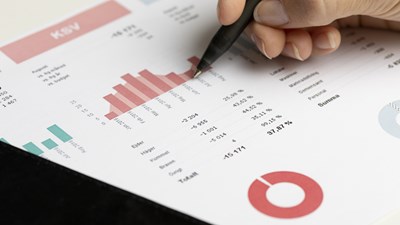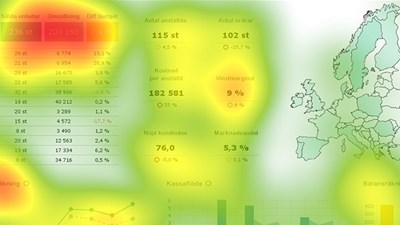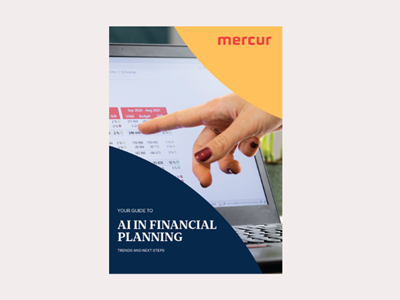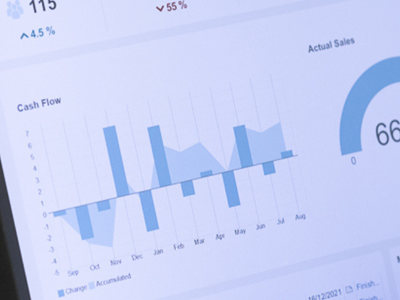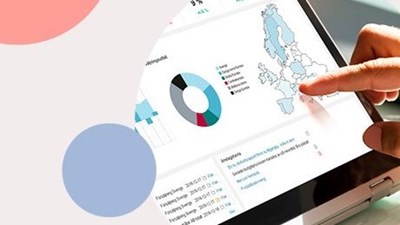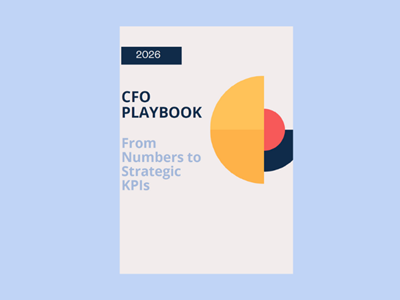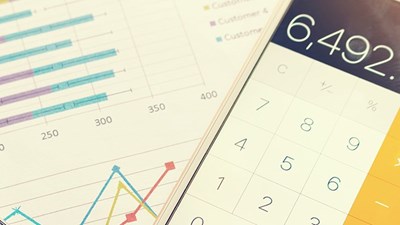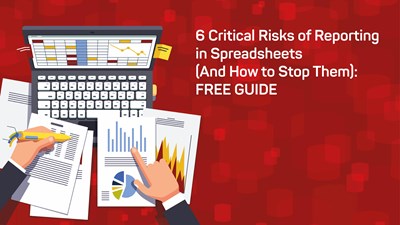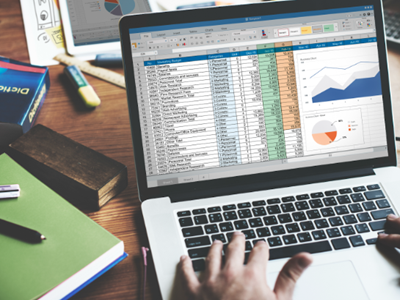
Business Budgeting Software: How to Choose the Right One
Choosing budgeting software is partly a finance and partly a strategic decision. The right tool helps organisations organise planning cycles, adapt as the market changes and increase accountability across departments. But not every platform will be a good fit. With so many options available, picking one can feel overwhelming, especially if you're trying to find one that’s just right.
This guide breaks down what business budgeting software actually does, why it matters and how to select a solution that corresponds with your team’s needs. Whether you’re scaling beyond spreadsheets or replacing an outdated legacy system, this article will give you a clear starting point.
What Is Business Budgeting Software?
Business budgeting software is a digital solution that helps organisations manage their financial planning. It can help you build budgets and track actuals based on its comprehensive forecasting abilities. It serves as a centralised platform where finance teams and department heads can collaborate on planning in real time.
These tools typically include modules for:
Annual budgeting
Workforce planning
Capital expenditure tracking
Scenario modelling and more
They also integrate with financial systems and ERPs to pull live data into your budgets, making it easier to track actuals versus plan and identify where you need to make adjustments.
Instead of exposing the organisation to spreadsheet risks or chasing approvals through email, you can track the entire workload in one secure platform.
Why Your Company Needs Dedicated Budgeting Tools
If you're still budgeting with spreadsheets, you already know how easily small errors can create big problems. It only gets harder to manage as the number of contributors and departments grows.
Here’s how dedicated business budgeting tools help avoid those pitfalls:
Accuracy improves through automated data imports.
Processes move faster with templates and approval tracking.
Collaboration improves when teams work in the same system.
Visibility increases with real-time dashboards.
Compliance is easier with built-in controls and audit trails.
The result? A more agile organisation that can plan ahead with confidence—and adjust more easily when things change.
6 Must-Have Features in Business Budgeting Software
A good budgeting platform can support your existing structure and provide scaling capabilities in case of an expansion. Here are six features you should look for when weighing your options:
1. Collaborative Planning and Role-Based Access
Budgeting is more than just a finance function. Other factors include sales, HR, operations and marketing, and they all have a stake in the numbers. This means more departments working on the same goals. As such, your software should allow for collaborative planning, where contributors can access the data they need without giving everyone full visibility into sensitive financials.
Role-based access ensures each team can input their budget, run department-specific reports and follow approval workflows, all within a shared system that’s easy to manage.
2. Real-Time Forecasting and What-If Scenarios
Markets shift, supply chains fluctuate, and goals change. The ability to forecast in real time and test different scenarios is one of the most valuable aspects of modern budgeting tools.
Your software should allow you to ask questions like:
What happens if revenue drops by 10% next quarter?
How will a new hire affect departmental costs?
What if you increase marketing spend by 15%?
Being able to answer these questions instantly gives your team a planning advantage.
3. Reporting and Dashboard Automation
Finance teams spend a lot of time compiling reports, which is something that business budgeting software can automate. Look for platforms that allow you to:
Build customisable dashboards for different teams
Export reports in various formats
Set up scheduled reports for meetings or periodic reviews.
When you reduce the reporting time, it becomes much easier to focus on the goals.
4. Integration with ERPs and Data Warehouses
Manual data entry is one of the leading causes of budgeting errors. Your budgeting solution should connect directly with your ERP, CRM, and any relevant data sources to pull in the latest actuals and transactions.
The more seamless the integration, the more accurate your reports will be. You won’t need to wait for someone to import last month’s data because it will already be reflected in your budgets and forecasts.
5. Audit Trails and Version Control
Budgeting often involves multiple rounds of edits and approvals, which is why it’s important to keep track of what has changed and who changed it. Audit trails show a full log of edits, and version control lets you revert to earlier plans when needed. This is especially helpful in larger organisations or during external audits, where transparency and traceability are non-negotiable.
6. Scalability and Multi-Entity Support
If your business includes multiple subsidiaries or regions, your software must support complex structures. Multi-entity support lets you:
Consolidate budgets across divisions
Plan and report in different currencies
Set unique assumptions per business unit.
Scalability matters too. A system that works for a 50-person company should still function well when you reach 500. That’s especially important if you’re aiming to implement the best enterprise budgeting software for long-term growth.
Mercur as a Top Business Budgeting Software Solution
Mercur is a business budgeting software solution designed to bring structure, automation and flexibility to the budgeting process. It supports everything from annual planning to monthly forecasts, and it works well for companies that need a single system to coordinate finance across departments.
Mercur includes:
A user-friendly interface for finance and non-finance users
Built-in integrations with systems like SAP and Microsoft Dynamics
Customisable dashboards and reporting tools
Strong audit trails and version control
Multi-entity support for complex business structures
Mercur is considered one of the best business budgeting software platforms for mid-sized to large businesses. We are a reliable option for companies moving away from spreadsheets or outdated financial systems and embracing automation.
Whatever your size or industry, today’s business budgeting tools can help you simplify planning, reduce errors and gain control over your financial future. If you’re ready to explore budgeting automation, schedule a consultation with us today.
Contact us for more information!
FAQs
What is the best business budgeting software?
Mercur is a top business budgeting software for firms looking to automate this process. We offer complete budgeting solutions as well as corporate performance management and business intelligence services.
Is Excel or Google Sheets better for budgeting?
Neither Excel nor Google Sheets are a reliable way to do your business budgeting. They are easily prone to errors and can have a drastic long-term impact on your work.
 Blog
BlogAI in Finance as a Powerful Tool
In this post, we explore how AI is evolving from a theoretical concept into a valuable resource for decision-making. Get useful insights for finance teams at any stage, from early exploration to actively using AI-powered solutions.
 Blog
BlogFive tips for a successful budget process!
How can you make your budget process more successful and maximise the effort that was invested in creating it? Of course, there are many factors to consider but we’ve chosen to highlight five key areas that will enable and help you create a smoother, value-creating and collaborative budget process.
 Blog
BlogThe Powerhouse of EPM Tools
A business’s success heavily relies on having a strong strategy. However, what's even more important is implementing that strategy while tracking and measuring the performance. This can easily be done by investing in enterprise performance management (EPM) software.
 Blog
BlogHow can AI help CFOs make better decisions?
Artificial Intelligence (AI) has significant potential to enhance decision-making for Chief Financial Officers (CFOs) by providing data-driven insights, automating routine tasks, and enabling more accurate forecasts.
 Blog
BlogBudgeting in a modern world
Thirty years after its debut, Microsoft Excel is still the preferred tool for budgeting and planning projects. However, its popularity is declining, due in most part to the rise of technology and subscription-based pricing for a myriad of SaaS-based products.
 Blog
BlogSave time and create a successful budget process
If you’re working in a large organization, you’re probably aware of how time-consuming the budget process can be. In this article we’ll give you tips on how to save time and still create a successful budget process
 Blog
BlogRolling Forecasts: Practical Steps, Benefits, and How to Get Started
Financial planning has changed. Traditional annual budgets can’t keep up with rapid shifts in the market, evolving customer needs, and internal performance dynamics. That’s why many finance teams are turning to a rolling forecast model.
 Blog
BlogWhy xP&A is a powerful game-changer
The newest iteration of planning, analysis and reporting systems is a powerful game-changer that unites company departments and boosts competitiveness. It’s called xP&A – the abbreviation of extended financial planning and analysis.
 Blog
BlogWhat is Corporate Performance Management? (CPM)
CPM, or Corporate Performance Management, is a process within corporate management aimed at measuring and optimizing the performance of an organization. CPM encompasses a range of activities, including budgeting, planning, forecasting, reporting, and analysis.
 Blog
BlogHow Automated Reporting Will Transform FP&A in 2026
This article highlights the power of report automation, how to implement it in your business and explores any new opportunities for accurate financial analysis in the long run.
 Blog
BlogBoost Report Readability, Engagement, and Decision-Making
In today’s fast-paced business environment, effective reports and dashboards are crucial for decision-making. Our user study using eye-tracking technology revealed seven key insights into what captures attention.
 Blog
BlogSpreadsheets are not Collaborative Tools
Spreadsheets were never designed for collaboration, yet they are the single most used program among teams and co-workers. They often start out as a quick document for storing, formatting or calculating information but evolve into important documents and are often the core records for an organisation.
 Blog
BlogAI in Financial Planning: Trends and Next Steps
Discover how finance teams are using AI to drive smarter planning, faster insights, and stronger business decisions.
 Blog
BlogBest Guide to Improve Your Revenue with Flexible Budgeting
Optimise your expenses with flexible budgeting, and learn how to adjust budget to reflect current business activities, market changes and cost fluctuations.
 Blog
BlogHow EPM Transforms Financial Planning and Forecasting
Struggling to keep plans aligned in a changing market? Discover how EPM helps finance teams move faster, stay accurate and lead with real-time insights.
 Blog
BlogRisks with working in spreadsheets
Spreadsheets are an essential tool for all types of organisations and businesses rely on them heavily, particularly for financial computations. The most popular spreadsheet program globally is, of course, Microsoft Excel, it’s used by an estimated 750 million people.
 Blog
BlogInformed Business Decisions at Maximum Velocity
The ability to process information swiftly is essential. If your business can’t manage your data efficiently, your company’s financial performance will surely underperform. At Mercur we have developed our own database Veloxic which helps Financial Planning and Analysis.
 Blog
BlogWhat Is Planning, Budgeting and Forecasting?
Planning, budgeting and forecasting are rarely static. Shifts in the industry often require you to revisit assumptions, adjust targets and adopt new processes. Learn how to strengthen your approach and stay ahead of change.
 Blog
BlogHow to Effectively Budget with Driver-Based Forecasting
Traditional models of forecasting rely on historical data and beliefs. It uses techniques that identify patterns, which are simple to use. However, with these methods, there are some challenges because they are not dynamic with today’s market, and can’t effectively analyse complex data.
 Blog
BlogBuild Long-Range Planning for Business Success
Discover how effective long-range planning aligns strategy, finance and operations for smarter decisions and sustainable growth.
 Blog
BlogBalancing Profitability and Sustainability
Sustainability has become a central concern for organisations across the world — and the UK is no exception. This evolving landscape places new demands on financial reporting.
 Blog
BlogHow do finance teams track KPIs across the entire organisation?
Learn how finance teams track KPIs across the entire organisation by consolidating data from multiple sources into a unified system like Mercur.
 Blog
BlogWhat Is FP&A? Definition, Purpose, and Best Practices
Without solid financial planning and analysis (FP&A), businesses operate in the dark. In this post we go deeper into the process of FP&A and why it’s important for businesses.
 Blog
BlogHow To Create a Successful Budgeting Process
When done well, budgeting helps organisations stay financially on course, even when things don’t go exactly as planned. Learn how to keep things on track so you avoid surprises and stay focused on your goals.
 Blog
BlogScenario Planning - Better control during uncertain times
Uncertain times create the need for more frequent forecasts and time for analyzing and comparing different future scenarios. We give you 5 tips on how to simulate future scenarios using scenario planning
 Blog
BlogThe Role of the CFO: Top Priorities and Responsibilities
Today's finance leaders steer more than just budgets and reports. The digital transformation ramps up with the increase of corporate complexity, and so does the role of CFOs.
 Blog
BlogBusiness Intelligence Reporting For Finance Teams
The real challenge today isn’t collecting data, it’s making sense of it and fast. Organisations turn to business intelligence (BI) to convert raw data into insight.But how do you actually do it right?
 Blog
BlogWhat is management reporting?
Management Reporting refers to the process of creating, analyzing, and presenting information about various aspects of an organization's performance to enable decision-makers to make well-informed decisions about the future.
 Blog
BlogHow to get accurate financial reports without waiting for month-end
You don't need to wait until month-end to see accurate financial reports. With modern financial systems you can access up-to-date reports whenever you need them.
 Blog
BlogTop 7 Manager KPIs for Financial and Operational Success
In today's post we'll break down why KPIs matter, which ones offer the most insight for finance and executive teams and how to ensure they're actually driving results.
 Blog
BlogAI and Machine Learning, what is it, and why is it important for the future?
Artificial Intelligence and Machine Learning, what is it, and what is the difference?
 Blog
BlogSpreadsheet Risk Management: Best Practices for 2025
Excel has long been a target for hackers; just one click on a malicious attachment can infect your entire network. So, how can you keep using spreadsheets while not sacrificing your safety?
 Blog
BlogCFO Playbook - KPIs for 2026
The role of the CFO is changing fast. Today, the finance function is expected to deliver more than reports — it must drive direction, speed and profitability through clear, actionable KPIs. Learn more in this guide.
 Blog
BlogBetter Revenue Planning
Sales forecasting is the process of predicting future revenue based on past data and trends. Read the blog to learn the best methods to do it right.
 Blog
BlogSpreadsheets Risk the Future of the Business
Spreadsheets often start as just a list for storing information and there is minimal process documentation, support or maintenance for these worksheets. Despite the fact that desktop applications such as Microsoft Office are included in the standard configuration of users' PCs, very little formal training is ever given to spreadsheet users.
 Blog
BlogMastering Spreadsheets
Where many businesses start small, a simple spreadsheet can adequately perform the limited tasks required of it. As the company grows, your spreadsheets can get more complex and harder to manage, by which point it feels like it will be too difficult to move to a different reporting tool.
 Blog
Blog3‑Statement Model for Better Financial Forecasting
Financial forecasting is critical for any business that wants to adapt to change. But finance teams keep usingfragmented models and manual processes. The 3-statement financial model is the solution.
 Blog
BlogWhy is our Excel-based budget always out of date?
Excel creates outdated budgets. Every time someone enters a figure, sends a file, or waits for another department to finish their section, your budget falls further behind reality.
 Blog
BlogZero-Based vs. Incremental Budgeting
Budgeting sits at the heart of sound financial management. This is why choosing the right technique is crucial for CFOs – it shapes resource allocation, cost control and strategic agility. Incremental and zero-based budgeting are two leading methods that offer distinct approaches.
 Blog
BlogVariance Analysis: A Comprehensive Guide
Senior executives are demanding more detail in their management reports. The amount of data available to finance departments has exploded and decision makers see this as an opportunity to get more insight into how the business is performing.
 Blog
BlogA practcial guide to scenario planning
Scenario planning gives you a clear, practical way to test assumptions, spot risks and opportunities, and make better strategic choices so your organisation stays resilient when conditions change.
 Blog
BlogTop PowerBI Alternatives in 2025
Explore the top PowerBI alternatives for 2025. Discover how Mercur delivers integrated planning, budgeting and reporting without the high cost and complexity.
 Blog
BlogAI in corporate budgeting
Artificial Intelligence (AI) can support decision making in key areas such as budgeting, capital allocation and even corporate strategy and as a result, it is increasingly being deployed in corporate performance management tools (CPM).
 Blog
BlogFP&A Trends Shaping Financial Planning in 2025
Many organisations cope with fragmented planning and data quality issues, which slow down their forecasting cycles. This forces organisations to take practical steps to turn ambition into execution.
 Blog
BlogCash Flow Forecasting
Inaccurate cash flow forecasting can be a costly mistake for companies. In today’s volatile market, relying on static annual budgets or manual spreadsheets leaves financial leaders without the agility to respond to uncertainty.
 Blog
BlogTop-Down vs Bottom-Up Budgeting
Budgeting aligns resources with strategic goals, and there are two primary approaches: top-down and bottom-up. Which method wroks best?
 Blog
BlogManagement Reporting Guide: Definition and Tips
Management reporting helps you see what’s really happening in your business. In this guide, we’ll explain what managerial reporting looks like and share practical tips.
 Blog
BlogThe Hidden Cost of Data Silos
If you ever feel like your teams speak different languages when it comes to data, it is a classic symptom of data silos. The information gets stuck in one department, system or tool, making it difficult for anyone to see the full picture.
 Blog
BlogFrom static budgets to agile financial management
Traditional budgeting has long been the cornerstone of financial planning in businesses. But today it can become more of a limitation than a strength. That’s where the concept of Beyond Budgeting comes in.
 Blog
BlogHow to succeed with your planning, budgeting, and forecasting process
We know it can be challenging to succeed with your planning, budgeting, and forecasting process. Therefore, we have gathered our best tips for you to succeed!
 Blog
BlogThe Business Benefits of Integrated Business Planning
This blog explores what IBP is and the typical IBP process. We highlight business benefits and how the right software can be a game-changer for your organisation.
 Blog
BlogThe Collaborative, Smarter Budget
In many organisations manual budgeting processes over-burden staff and create masses of data which overwhelms department heads and stops them seeing the bigger picture.


